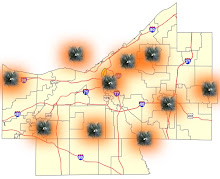There are worries that the poorer areas around Case Western Reserve University may evolve into . . . . . . .gasp! . . . .a Georgetown-like community that will shake up the neighborhoods, forcing demographic turnover and wealth development.
See Steven Litt's Sunday PD article here.
I believe that this type of conversion is what this region and city has been wishing would occur around such areas as University Circle. Gentrificaiton is part of the life and death of urban neighborhoods, especially in an American context. If you want creative-class types with taxable incomes and disposable cash, these kinds of neighborhoods need to exist adjacent to University Circle.
Although many of the political-types and civic leaders avoid saying this directly, they all would rather have Georgetown-like or Cambridge-like neighborhoods around University Circle. I don't see any of them aspiring to replicate the town-gown situations that exist with Yale + New Haven or the University of Pennsylvania + West Philadelphia.
Subscribe to:
Post Comments (Atom)





3 comments:
From spending considerable time roaming the Georgetown (as a highschool & adult) and Cambridge-Harvard (as a grad student)
neighborhoods it is readily obvious that these neighborhoods are what they are because they have evolved as such, fortunately for the most part, in a positive way. The problems they are now facing come about not from their evolution but from the development plans being placed upon them; plans that have the effect of stifling the natural evolution. To some extent, the these plans are perhaps contributing to an unhealthy devolution in these neighborhoods.
Frankly, at the momment University Circle looks in on itself (even the much-ballyhooed Triangle does so) while presenting no neighborhood face. Adding to the "insult" is RTA line which separates Case from its natural "Georgetown" neighborhood, Little Italy.
What is a more ethically responsible decision to benefit the poorer residents of this City... encouraging further outward migration of the wealthier class and their disposable incomes (and the wage-earning jobs that follow) and leaving behind an aging city and its further decaying surplus of housing and buildable lots? OR creating a City of more than one income group in which demands of services and consumables create jobs fewer than three bus transfers away and make these services available to more than just one priviledged class of people?
Cleveland, a City which once housed over a million people but now houses fewer than 500,000 (within its limits) can handle the RE-gentrification of one of its neighborhoods. There NEEDS to be a closer middle and upper class for the benefit of its current residents and employees.
Once again, it seems that the Cleveland community can't do the one thing they need to do (across the baord): GET SOMETHING DONE.
The number of projects/plans that have been proposed in the past five years that have gone NOWHERE is astounding. Petty infighting and endless hand-wringing seems to accompany every project, every plan. The lakefront can't be developed because nobody has the guts to close Burke airport. The Flats project is stalled because property owners are holding up the process, or, depending on your point of view, the city/developer isn't offering them enough money for their land. Acres of the downtown cityscape are left as surface parking lots because nobody is willing to pay what it costs to get that land back. And University Circle--an absolute slam-dunk, easy-as-pie, build-it-and-they-will-come development opportunity--is seeing nothing happen because CWRU can't think out of the box. I don't doubt residents in the area need to be involved in the process (God knows the top-down management of major projects hasn't exactly worked wonders in the city in the past), time is of the essence here. This project has to be handed off to somebody who knows what they're doing. Sadly, I don't think that person will be found anywhere in the city government or at Case, which as we know has its own problems of late.
I don't even live in Cleveland anymore. Any news I get about the development scene I get from the Plain Dealer. And each week, there is more bad news. From the outside, maybe I can see what insiders can't: Unless somebody starts getting something done, Cleveland is going to keep slipping, keep losing jobs, keep losing people.
It's just astounding that a developer can build something like Crocker Park--and get people to move, essentially, to a mall--with such success out in the suburbs, but nobody is doing anything even comparable to that in the city, which would be a much safer bet, you would think. Makes you wonder: Why?
Post a Comment